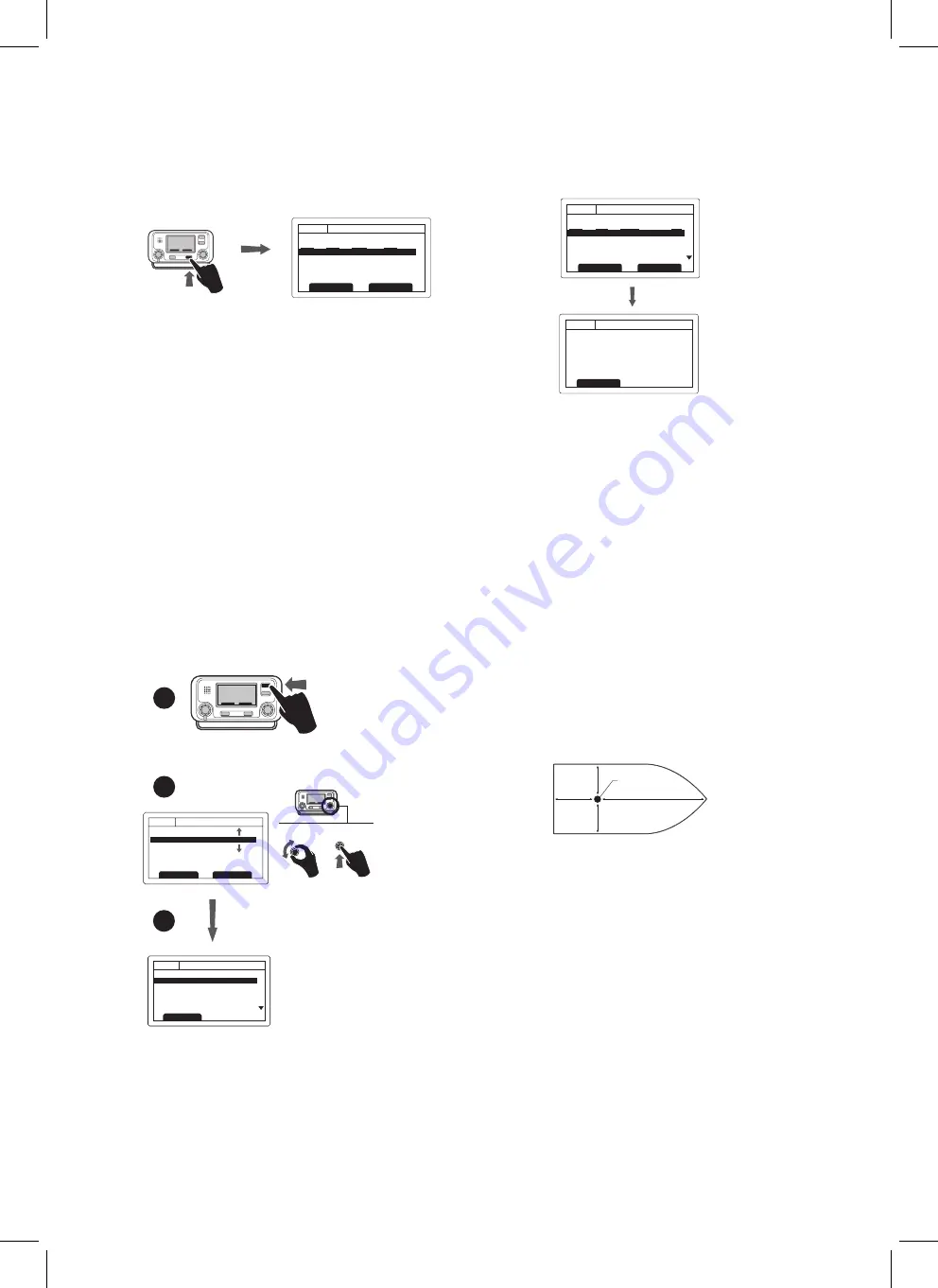
Receiving AIS text and safety related
messages
Receipt of AIS text messages is indicated by the presence of the
message icon in the status bar. This symbol appears whenever
unread AIS text messages are present. The messages can be
viewed by moving to the ‘Messages’ screen.
13:20:47
RECEIVED MESSAGES:
DATE
TIME
FROM
T YPE
29/01
10:00
MARY R... B R Safety
29/01
09:55
556444321 AD Safety
28/01
21:45
REGENT B R Binar y
OK
GPS
INT
View
Screen
Vessel and voyage data
The ‘Voyage data’ menu provides quick access to the most
frequently changed Inland AIS parameters. In this menu you can
set the following parameters:
●
Navigation status.
●
Destination - Set the destination for the current voyage.
●
ETA – Estimate the time and date of arrival at the destination.
The date format is dd/mm and the time format is hh:mm using a
24 hour clock and UTC time.
●
Draught – Enter the maximum draught for your vessel in
meters. The format for this value is xx.xm (eg 02.5m). The
maximum depth is 25.5 m.
●
The cargo status of the vessel as ‘Loaded’ or ‘Unloaded’.
●
The number of blue cones and blue flag status for the cargo (1,
2 or 3 blue cones, or blue flag).
●
The static draught of the vessel to the nearest centimetre.
●
The air draught of the vessel to the nearest centimetre.
●
The number of crew members (0 to 254 or “unknown” ), the
number of passengers (0-8190 or "unknown ") and other
personnel (0 to 254 or "unknown").
●
The number of assisting tug boats (0 to 6)
12:34:10
MAIN MENU:
OK
GPS
INT
Back
Select
1
2
VOYAGE DATA
MESSAGES
USER SET TINGS
INSTALLATION
MAINTENANCE
1
2
13:20:47
VOYAGE DATA:
Nav Status:
>>(15) not defined (default)
Destination:
>>Not Available
ETA:
--:--:--
Draught:
Not Available
OK
GPS
INT
Back
3
.
System alarms
The status of AIS alarms is displayed on this screen. If active, but
not yet acknowledged alarm conditions exists, the alarm icon
flashes in the status bar. When a new alarm condition occurs, the
acknowledgement screen is immediately displayed.
13:20:47
ALARMS LIST:
DATE
TIME
ALARM
ACK
25/11
16:13
No valid ROT...
Yes
25/11
16:11
Heading lost...
Yes
25/11
16:11
External EPFS...
Yes
OK
GPS
INT
View
Screen
13:20:47
ALARM DETAILS:
ALARM: No valid ROT information
ID:
35
DATE:
25/11/2010
TIME:
16:13:30
ACK:
Yes
OK
GPS
INT
Exit
Ship data for convoys
The inland AIS dimensions and the vessel type must be the overall
size and the type of the convoy. Enter the ship's data as follows:
1.Set the length and breadth of the convoy, and the ERI ship type.
a. From the main menu select the ‘Installation’ submenu.
b. Select “Inland AIS” and then select “Inland vessel data”.
c. Select the ‘Length’ field and enter the total length of the
convoy to the nearest 0.1m*.
d. Select the ‘Beam’ field and enter the total width of the
convoy to the nearest 0.1m*.
e. Select the ERI entry and enter the code that best
describes the convoy. A complete table of ERI vessel
type codes is provided at the rear of the user manual.
2.Configure the GNSS antenna location for the convoy.
a. From the main menu select the ‘Installation’ submenu.
b. Choose “Dimensions” and then select “Internal
Dimensions”.
c. Enter the dimensions A, B, C and D for the internal GNSS
antenna (antenna connected directly to the Inland AIS).
The dimensions should be rounded to the nearest whole
meter*.
A
GNSS-Antenne
B
C
D
* Note that the length and width of the vessel entered in step 1,
must correspond to the antenna dimensions entered in step 2. The
dimensions entered in step 1 are rounded to the nearest whole
meter and compared with the dimensions entered in step 2. In the
case of a discrepancy during entry of the dimensions a warning is
displayed. This notice may be acknowledged by pressing the ‘OK’
function key.


